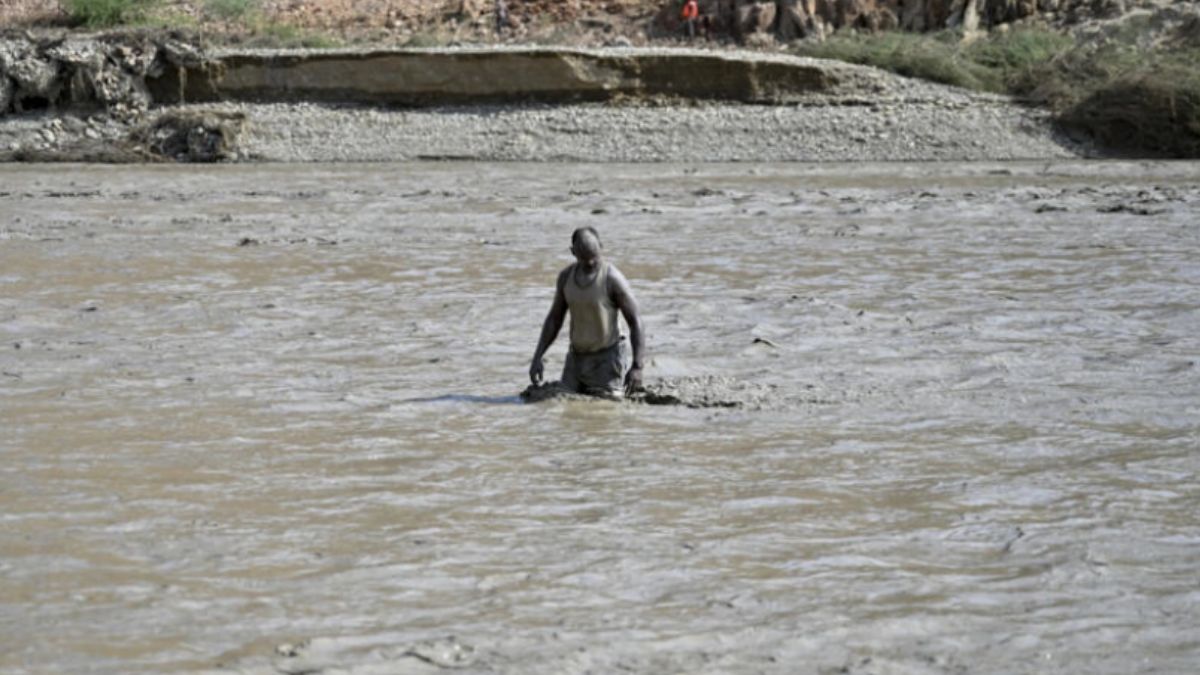With current wind speeds of 289.6 kmph, Hurricane Milton is making its way to Florida and is expected to make landfall late Wednesday night. A Category 5 storm, Milton is the third fastest-intensifying storm on record in the Atlantic, which experts fear could make it devastating and catastrophic read more
)
A drone view shows storm clouds over the Caloosahatchee River as Hurricane Milton approaches Fort Myers, Florida. Reuters
“You should evacuate now, now, now. You should have already evacuated. It’s a matter of life and death, and that’s not hyperbole,” said US President Joe Biden as the country, especially the state of Florida, braces for Hurricane Milton, the Category 5 storm, which is set to make landfall late Wednesday, early Thursday.
Hurricane Milton is barrelling toward the southeastern United States just two weeks after Hurricane Helene wreaked havoc and devastation. Helene, which has been linked to more than 200 deaths, made landfall along Florida’s Big Bend on September 26 as a Category 4 storm with 140 mph winds.
Milton, which has been recategorised as a Category 5 storm, has the potential to be “one of the most destructive hurricanes on record for west-central Florida”, said the US National Hurricane Centre, adding, “This is a very serious threat and residents in Florida are urged to listen to local officials. Residents should get their families and homes ready – and evacuate if told to do so.”
But why are experts so scared of Hurricane Milton? What makes it so deadly? What is it like being in a Category 5 hurricane? Let’s explore.
How strong is Hurricane Milton?
Between Sunday and Monday morning, just 24 hours apart, Hurricane Milton grew from a tropical storm to a fierce Category 5 hurricane. On Sunday (October 6), Milton’s wind speeds were 65 mph (104.6 kmph) and this escalated to 155 mph (249.4 kmph) on Monday (October 7) as it made its way across the Gulf of Mexico toward Florida.
At present, Hurricane Milton has winds hitting a roaring 180 mph (289.6 kmph) — making it one of the strongest hurricanes to hit the US. “This is nothing short of astronomical,” Noah Bergren, a Florida-based meteorologist told The Guardian, adding “This hurricane is nearing the mathematical limit of what Earth’s atmosphere over this ocean water can produce.”
Even the US National Weather Service in its forecast wrote that Milton had “some of the most explosive intensification this forecaster has ever witnessed!”
With the way Milton has intensified, the US National Hurricane Centre called it the third-fastest intensifying Atlantic storm on record. Notably, “rapid intensification” is measured as 30 knots in 24 hours — that’s roughly 55.5 kmph daily. However, Milton has increased by more than double this definition.
Why did Milton intensify so quickly?
The simple answer is unusually warm ocean water. Experts note that climate change is causing this rapid intensification, as it is known in the meteorological world. They have observed that the accumulation of greenhouse gases traps heat in the atmosphere. This, in turn, leads to record-breaking temperatures both on land and in oceans, resulting in powerful storms.
Explaining this, Brian McNoldy, a climatologist and a senior research associate at the University of Miami Rosenstiel School, told Vox that the temperatures in the Gulf of Mexico were the hottest on record this August. That unusual warmth has continued and has helped Milton to strengthen so fast.
Other experts concur. They say that the core of Milton is passing over exceptionally warm water — around two degrees Celsius to three degrees Celsius hotter than the average for this time of the year. This is turbocharging Milton, just as it happened with Helene two weeks ago.
While climate change is being pinpointed as the primary factor for this situation, climate specialists note that one can’t ignore that the lingering effects of El Niño, and perhaps even a volcanic eruption, are to blame.
Another reason for Milton’s rapid intensification is the lack of wind shear in its path. For the unaware, wind shear describes the change in wind speed and direction. Moreover, Milton is also relatively small in width. Small hurricanes are “generally more prone to ups and downs,” said McNoldy, because they’re influenced more easily by weather phenomena.
What damage could Milton cause to the people?
Hurricane Milton, set to make landfall, is said to be catastrophic, with some noting that it would take months or even years of rebuilding and piecing together shattered lives. Storms such as Hurricane Milton will reportedly decimate homes, tear roofs, collapse walls and trees and make areas uninhabitable for weeks if not months.
It is also expected to cause power outages that could last for months. It could also cause post-traumatic stress for some adolescents and adults. As John Feerick, AccuWeather.com senior meteorologist, told The Independent that the damage from a Category 5 is nearly unsurvivable. “Most structures are basically blown off of their foundation. This is basically like an EF-4 tornado. But, instead of a tornado, that’s maybe a couple of hundred yards wide, this is going to impact a much larger area with winds of 150 mph or more,” he said.
Tom Krall, a resident of the US Virgin Islands who experienced Category 5 Hurricane Irma told NPR that the winds feel “kind of like if you’re driving in a car at 75 and you stick your head out the window. You’ve got that kind of an uncomfortable thing in your ears.”
The dangers that this storm poses have also prompted Joe Biden to cancel a trip to Angola and Germany less than a day after it was announced.
How prepared is Florida for Milton?
Bracing for landfall, US authorities have ordered people to leave Florida, resulting in the largest evacuations in the state’s history. The evacuations have led people to leave their homes and lives behind, leading to crawls on highways; the New York Times reported that roads on Monday saw 150 per cent of normal traffic.
The evacuations have also led to acute gas shortages; almost one-fifth of Florida’s gas stations were out of fuel by Tuesday afternoon.
Expressing just how dangerous Milton could be to residents, the Mayor of Tampa Jane Castor said, “If you choose to stay … you are going to die.”
With inputs from agencies

 1 month ago
9
1 month ago
9
)
)
)
)
)
)
)
)
)
)
)
)
)
)
)
)
)
)
)
)
)
)
)
)
)
 English (US) ·
English (US) ·